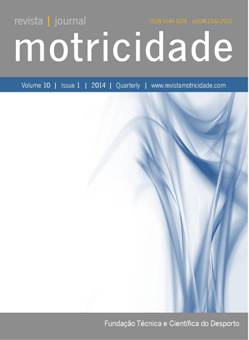Organização e metodologia de ensino da natação no 1º ciclo do ensino básico em Portugal
DOI:
https://doi.org/10.6063/motricidade.2709Resumo
Foi objetivo deste estudo conhecer a organização e a metodologia de ensino da natação desenvolvida no âmbito da Expressão e Educação Físico-Motora no 1º ciclo do ensino básico (1º CEB) em Portugal. A amostra incluiu 89 responsáveis por escolas de natação municipais e 100 professores que ministram as respetivas aulas. Para aferir a organização e a metodologia de ensino foram aplicados dois questionários, cujos resultados foram descritos com base em técnicas de análise estatística descritiva. Os resultados sugerem que a natação no 1º CEB rege-se sobretudo pelas orientações do Ministério da Educação. A restrição orçamental (60.0%) e a dificuldade no transporte dos alunos da escola (54.0%) para a piscina são as razões mais apontadas para a supressão da natação. O ensino é dirigido fundamentalmente para o terceiro e quarto ano (80.1%), com aulas de frequência semanal (64.4%) em classes com um elevado número de alunos (13 a 16 alunos). Os principais objetivos das aulas estão relacionados com a adaptação ao meio aquático, privilegiando-se as habilidades aquáticas básicas (81.4%), num ensino pouco suportado em material pedagógico. Os dados relatados permitiram-nos identificar algumas insuficiências no enquadramento da natação no 1º CEB, provavelmente condicionantes da eficiência do processo de ensino-aprendizagem, ao nível da aquisição de habilidades aquáticas mais complexas.
Downloads
Publicado
Edição
Secção
Licença
Os autores dos manuscritos submetidos para publicação deverão ceder, a título integral e permanente, os direitos de autor (copyright) à revista Motricidade e às Edições Sílabas Didáticas. A cedência de direitos de autor permite a publicação e divulgação do artigo em formato impresso ou eletrónico e entrará em vigor a partir da data de aceitação do manuscrito. Os autores concedem, ainda, os direitos para a revista Motricidade utilizar e explorar o respetivo artigo, nomeadamente para licenciar, ceder ou vender o seu conteúdo a bases de resumos/indexação ou outras entidades.
Nos termos da licença “Creative Commons”, os autores poderão reproduzir um número razoável de exemplares para uso pessoal ou profissional, mas sem fins comerciais. Nos termos da licença SHERPA/RoMEO, os autores poderão, ainda, disponibilizar/arquivar uma cópia digital final (versão postprint) do artigo no seu website ou no repositório científico da sua instituição.


